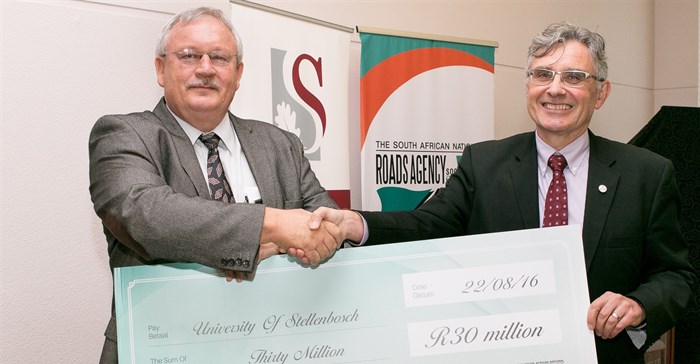In a symbolic ceremony at the Geotechnical and Transportation Division hosted within the University's Department of Civil Engineering, the South African National Roads Agency SOC Ltd (SANRAL) announced a R30-million endowment to Stellenbosch University which will continue to fund the SANRAL Chair in Pavement Engineering at the University.

Kobus van der Walt, Regional Manager, SANRAL WR and Prof de Villiers, SU Rector and Vice-Chancellor
Established in 2001 with the financial support of SANRAL, the academic programme of the Chair is committed to the development of human capital and capacity building in the field of pavement engineering (the study of the performance of road “surface” materials and structural considerations for road paving). The Chair also contributes to research that addresses the needs of the country’s road industry and the training of the next generation of pavement engineers.
“We don’t just invest in building roads and bridges but also in our communities,” says Kobus van der Walt, regional manager, SANRAL Western Region.
Developing human capital and road building technologies
“The mobility of people and transportation of merchandise is crucial for generating economic growth and alleviating poverty in developing countries. Cost-effective roads infrastructure is, therefore, vital to create employment, improve living standards and increase South Africa’s global competitiveness. Roads are the arteries of an economy, connecting farmers to local markets, providing commuter routes and communication networks, and linking countries with global markets. The SANRAL Chair supports socio-economic expansion through developing human capital (pavement engineers) and innovative, sustainable road building technologies for optimal infrastructure solutions,” says Prof Wim de Villiers, rector and vice-chancellor.
The SANRAL Chair offers specialised postgraduate courses to students and practitioners in the roads industry to keep them abreast of new trends and developments in the global environment. It is also responsible for teaching at undergraduate level, creating awareness about pavement engineering among students and for managing the asphalt and pavement research laboratories. The research undertaken includes innovative material investigations and performance analysis, road rehabilitation and recycling technologies and sustainable road construction practices, numerical modelling, and design systems for pavements, as well as appropriate seal and asphalt technology for developing areas through to freeways.
Among its defining features is its cooperation with international institutions of higher learning in Rwanda, Brazil, China, the Netherlands, Italy and the USA, resulting in academic exchanges, collaborative research and the transfer of knowledge. Locally it works closely with the Council of Scientific and Industrial Research (CSIR), the South African Bitumen Association (Sabita) as well as other South African Institutions of Higher Learning and continues to contribute to the development of industry guidelines.
The road agency’s educational reach goes even further, explains Van der Walt. It launched a programme in 2008 offering, to date, scholarships to 192 school learners and bursaries to 108 students at eight of South Africa’s leading universities. It also provides internships to engineering students to facilitate the attainment of their degrees and provide mentorship support to bursary holders with assistance on practical projects, if required, during their studies.
Meeting the skills gap
This enables SANRAL to meet the broadening skills gap within the pavement engineering field.
Stellenbosch University’s Professor Kim Jenkins, incumbent of the SANRAL Chair, comments that the postgraduate programme has gone from strength to strength. "Every year, between 10 and 15 new postgraduate students are registered, bringing the total number of current students to between 35 and 45 students. Seven doctoral and 51 Master’s degrees have been awarded under the study leadership of the Chair. Two-thirds of students come from historically disadvantaged communities, reflecting both SANRAL’s and the institution’s commitment to diversity."
Prof Jenkins serves regularly as a member of several international scientific committees and participates in international conferences, having published widely in academic journals and industry-related publications. He also chairs an international committee on recycling of road building materials linked to sustainable practice.
At tertiary level, SANRAL also cooperates with the University of the Witwatersrand in supporting about 200 academically talented learners from socio-economically disadvantaged backgrounds as well as the Chair of Transport Planning at the University of Cape Town. The agency also funds the Maths and Science Chair at the University of Free State.
“True, SANRAL build roads – but people are top of our priorities,” Van der Walt concludes.





















































